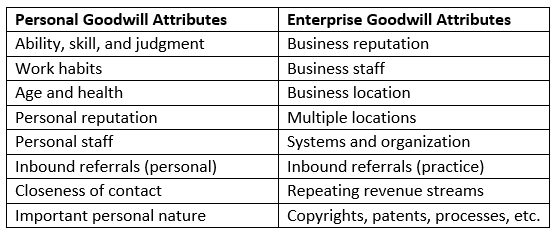In recent years, many independent physician practices have been approached by private equity (PE) firms or other corporate entities to discuss the prospects of a potential partnership or transaction. According to LevinPro HC, PE companies have been involved in over 200 physician practice deals in the last year alone. [1]
When determining whether or not to sell, shareholders need to consider several factors, including the strategic and cultural fit of the acquiring organization, the transaction structure, and the resulting allocation of transaction proceeds to the physician owners. With regard to the final item, physician owners face a common issue: the disparity in payout between the physician owners. In these instances, the sale of personal goodwill could be a viable solution to keep physician owners satisfied and transaction progress on track.
Equal Ownership, Unequal Value
A typical transaction between a PE firm and a physician practice or medical group involves the sale of all nonclinical assets to a management services organization (MSO), which is created to provide management services to the practice following the transaction. The MSO and the acquired practice enter into a management services agreement, which outlines both the services that will be provided to the practice going forward and the fair market value of the associated management fee.
Typically, the selling physicians remain employed by the practice and agree to take a 20% to 30% reduction in compensation—referred to as a “scrape”—to allow the practice to generate positive earnings before interest, taxes, depreciation, and amortization (EBITDA) on a go-forward basis. The purchase price for the practice is generally based on a multiple of the normalized historical EBITDA. Additionally, the physician owners might receive “rollover” equity in the MSO to ensure long-term alignment and incentivize post-close growth.
As a result of this deal structure, organizations must determine how the transaction proceeds will be distributed to the physician owners, as well as the tax treatment of the proceeds. In many cases, the physician practice is structured as a professional corporation and taxed either as a “c” corporation or an “s” corporation before the transaction, and ownership is split equally among the physician owners.
However, despite equal ownership, physician owners may receive varying levels of compensation. This is due to the fact that payment is based on personal production and collections, which often vary significantly among the physician owners. A compensation scrape represents a different amount for each physician, due to the disparity in pre-transaction compensation, as shown in the example in table 1.
Table 1: Example Scrape Disparity

As we can see, even though the selling physicians have equal ownership in the practice, their contribution to value is disproportionate due to the varying levels of pretransaction compensation. In order for the cash portion of the purchase price to receive capital gain treatment and the rollover equity component to be tax deferred, the sale proceeds associated with the practice acquisition must be allocated to each physician based on pro rata ownership. If the proceeds for a particular physician exceed the pro rata amount, a portion of the proceeds will be taxed at ordinary income rates, which can create a significant obstacle in closing the transaction due to the dissatisfaction of the more productive physicians.
To mitigate this, under the right circumstances, physicians may be able to sell their personal goodwill separately from the sale of the business assets in order to receive an allocation of the purchase price that is commensurate with their value contribution in a tax-efficient manner.
Defining Personal Goodwill
In short, personal goodwill is an intangible asset that is unique to each individual. It is the reputation that a physician has built over the years with their patients, colleagues, and community. Due to its intangibility, personal goodwill is not something that can be easily transferred to a new owner and is often difficult to quantify. Personal goodwill exists when the physician’s reputation, expertise, or contacts contribute significantly to a practice’s value and future income stream.
Tax Court Backing of Personal Goodwill
Case law precedent illustrates that with proper consideration and documentation of the relevant facts, personal goodwill can be identified and sold separately from enterprise goodwill. A few notable cases where tax courts ruled in favor of the taxpayer claiming personal goodwill are detailed below.
Martin Ice Cream Co. v. Commissioner
In this case, a taxpayer sold an ice cream business and claimed a portion of the sale price was attributable to their personal goodwill. The IRS argued that the entire sale price was attributable to the goodwill of the business itself. The tax court sided with the taxpayer, stating that personal goodwill is a distinct asset that can be sold separately from the goodwill of the business.
Norwalk v. Commissioner
In this case, the taxpayer sold their accounting practice and allocated a portion of the sale price to personal goodwill. The IRS argued that the entire sale price was attributable to the goodwill of the business itself. The tax court sided with the taxpayer, stating that personal goodwill is a property right that can be sold separately from the goodwill of the business.
Bross Trucking Inc. v. Commissioner
In this case, the IRS claimed that Bross Trucking distributed intangible assets—including goodwill—to a sole shareholder, who then transferred the intangible assets to a newly created trucking entity owned by the shareholder’s sons. The sole shareholder had years of industry experience and established personal relationships with the primary Bross Trucking customers. The court found that personal goodwill existed through these relationships separate from Bross Trucking.
The Supporting Evidence
While these examples show tax courts will rule in favor of taxpayers claiming personal goodwill, the right facts and circumstances need to be in place for this to occur. Below are key factors that should be considered before structuring a deal that involves the sale of personal goodwill to ensure it is separable and transferable to a potential buyer.
• Prior Noncompete Agreements: Physician owners should not have a noncompete with the practice prior to the sale of the organization, for if a noncompete exists, the physicians have effectively already transferred their personal goodwill to the organization and are unable to separately sell their goodwill in a subsequent transaction.
• Separate Personal Goodwill Purchase Agreement: In a transaction involving the sale of goodwill, a separate goodwill purchase agreement should be executed apart from the purchase agreement for the business assets in order to clearly demonstrate that the purchase of the personal goodwill is independent of the sale of the practice’s assets.
• Post-Close Employment Agreement/Consulting Agreement: Further support for the claim of personal goodwill can be provided through the use of post-close employment agreements or consulting agreements, as these demonstrate that an individual’s contribution to the practice is critical for sustaining the practice’s cash flow.
Developing a Credible Valuation of Personal Goodwill
Once a physician’s personal goodwill has been established as separable from the business and able to be transferred to the prospective buyer, its value must be determined. To do so, a variety of factors will be considered, including years of experience, level of expertise, reputation within the medical community, and patient relationships. These factors can be difficult to quantify, however, which is why personal goodwill is often a point of contention during the sale of a physician practice.
The “With and Without” Method
A common approach for assigning value to personal goodwill is the “with and without” method, which compares the practice’s projected cash flows under two distinct scenarios.
• Scenario One: The physician owner continues to actively contribute their personal goodwill to the practice.
• Scenario Two: The physician owner leaves the practice, and the practice’s cash flows are impacted as a result of patients leaving.
The difference in the practice’s enterprise value under each scenario represents the total personal goodwill to be allocated to the physician owner.
The Multi-Attributable Utility Model (MUM)
The MUM is a well-established method used in many disciplines for decision support. If used appropriately, the MUM can also be an effective tool for identifying and documenting factors that support personal goodwill apart from the practice’s enterprise goodwill.
When employing the MUM, valuation specialists will assign utility scores to both personal goodwill attributes and enterprise goodwill attributes by identifying whether or not they are present, and if so, assessing their importance. Once utility scores have been determined for each attribute, the results are aggregated to determine the proportion of total goodwill that is attributable to personal goodwill versus enterprise goodwill.
Table 2 presents a list of personal and enterprise goodwill attributes that are commonly considered when employing the MUM.
Table 2: Goodwill Attributes

Regardless of the method used, obtaining a third-party expert to perform the valuation of personal goodwill is highly recommended given the subjectivity and potential risk associated with quantifying this intangible asset.
Unlock Value to Ensure a Fair Deal
In the realm of physician practice sales, personal goodwill can stand as a crucial factor. This unique asset, which is tied directly to a physician’s reputation, relationships, and expertise, adds undeniable value to a practice. Yet, the quantification and transfer of this asset can present challenges. Recognizing and maximizing personal goodwill is key for sellers and can act as a mechanism to ensure equitable deals. Physicians selling their practices should assess the worth of their personal goodwill diligently, with expert appraisal support, to help secure fair compensation.
Copyright 2023, American Health Law Association, Washington, DC. Reprint permission granted.
[1] Levin Pro HC, Levin Associates (data as of July 1, 2023).


